Mindfulness and Meditation are the most popular practices for relieving stress and nurturing mental health. Yet, these are distinct practices backed by science focusing on mental wellness.
Mindfulness is the art of being fully present in the moment and aware of one’s thoughts and surroundings without judgment.
On the other hand, meditation is a practice that often involves focusing the mind to achieve a state of calm and clarity.
Together, both are powerful when practiced with proper techniques for emotional well-being.
In this article, you’ll learn the difference between Mindfulness and Meditation, the practices followed in meditation and mindfulness, the benefits, the best courses offered, and much more.
Mindfulness Vs. Meditation: What’s The Difference?
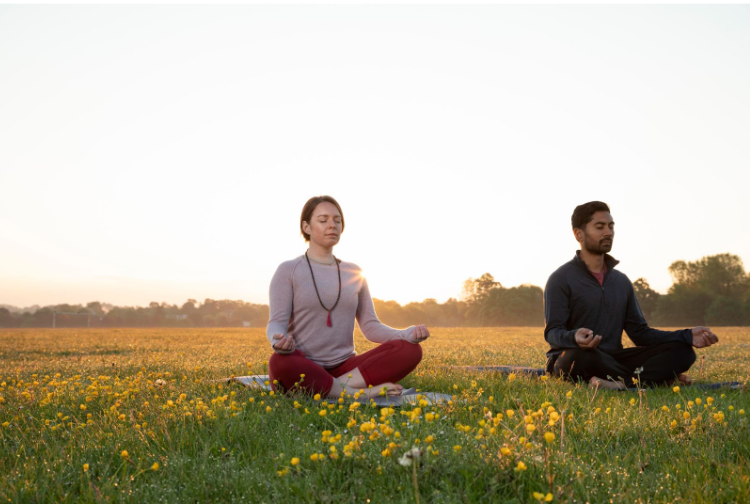
It seems that Mindfulness and Meditation are the same. But let me clarify: Both of these practices and the techniques followed are different.
Mindfulness focuses on being aware of the present moment without any judgment. This practice involves your thoughts, feelings, and surrounding environment. Meditation can be considered in Mindfulness as it is a state of calm mind that helps in decision-making and boosts productivity. Mindfulness can be practiced anytime, anywhere.
Meditation basically helps to develop Mindfulness. It involves a different technique isolated from a mass environment. You need to sit silently and concentrate on your breath or any object that develops your attention and awareness. Meditation requires intentional focus to connect with your inner self. It is done by isolating yourself and concentrating on being in one place.
How To Practice Mindfulness And Meditation?
The practices of Mindfulness and Meditation vary from one another. The mindfulness technique is used wherever you go, while meditation is an exercise that is done from one place.
Here, I’ll guide you through both practices.
Mindfulness Practice
This practice includes various techniques to cultivate mindfulness. It helps to connect your mind and body at any place in every situation.
- Focus while Working – You can practice mindfulness while eating, walking, doing housework, and even during workouts. Select a regular activity and focus on staying aware of that moment.
- Acknowledge Each Day – Wake up with gratitude every day. Make each day special and accept your existence and reality. This is a mindfulness practice to acknowledge your day.
- Engage your Senses – Staying focused on what you can see, hear, feel, taste, and smell in the present moment increases your ability to be aware.
- Pay attention to your Thoughts – Control your thoughts while doing any work. Notice your thoughts. If they arise, don’t get carried away; acknowledge them and bring your attention back to the present moment.
- Daily Routine – Integrate mindfulness into your daily routine. Choose specific activities to perform mindfully each day, anywhere you go.
Meditation Practice
Meditation is an exercise that is practiced to stay focused on a daily basis. It aims to connect your mind and body to bring physical and mental peace.
- Select a Quiet Space – Find a quiet spot without any disturbance where you can peacefully meditate and stay focused.
- Sit Comfortably – Sit in a comfortable position, either on a chair or on the floor. Don’t stress your body while seated for long hours or in an uncomfortable position.
- Choose any Meditation type – You can meditate while sitting in a peaceful space, focusing on breathing or any object. You can even chant a mantra while meditating.
- Focus on Breath – Close your eyes and take a deep breath. During meditation, focus on breathing and feel the sensations while inhaling and exhaling.
- Set a time limit – You can set a timer for meditation, ranging from 5 to 60 minutes, depending on your consistency. If you are new to meditation, set a limit of 5 to 10 minutes and stay focused.
Mindfulness vs Meditation: What Are The Benefits?
Everyone can benefit from Mindfulness and Meditation. These techniques and practices are beneficial for many reasons, as follows;
- Reduce Anxiety and Stress – Mindfulness focuses on reducing anxiety levels. Daily meditation practices help to relieve stress. The constant practice will help to control overthinking and anxiety and resist stress.
- Enhance Focus – Both Mindfulness and Meditation improve your ability to concentrate and stay present in the moment.
- Calm and Relaxation – The daily practice induces a state of deep relaxation, eliminating chaos and embracing inner peace.
- Overcome Depression – Many yoga instructors and physicians suggest meditation to overcome depression. Mindfulness and Meditation positively impact life to stay cheerful and focused without any depression.
- Improve Emotional Well-being – Mindfulness and Meditation help to stay balanced and observe emotions before concluding a judgment.
Mindfulness Vs. Meditation: Are There Any Drawbacks?
Mindfulness and Meditation do not have any drawbacks. It depends on the amount of time and patience you invest in both practices. You need to learn how to meditate and mindfulness with proper routine and discipline.
Both the practices of Mindfulness and Meditation help you to focus on self-care and self-connection. It is considered to be safe for everyone to have a healthy life.
The more you practice, the more you connect with your inner self and elevate yourself physically and emotionally. If you are not consistent, that will be a drawback, creating more confusion and less self-trust.
Best Mindfulness And Meditation Courses
From personal experience with a few courses included in the Mindfulness and Meditation list below, I’ll guide you with the best 5 courses;
Top 5 Mindfulness Courses
The Mindfulness courses build each one emotionally and physically strong and balanced. Here is the list of the top 5 courses.
1. The Science of Well-Being
The Science of Well-Being course is offered by Coursera, an e-learning platform. It is instructed by Yale University’s Prof. Laurie Santos.
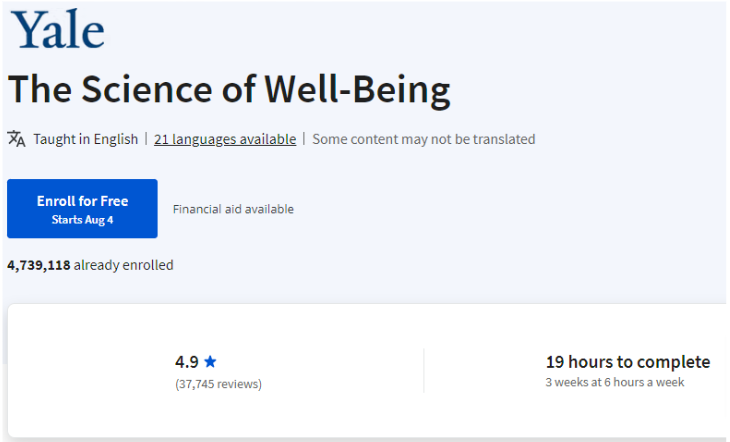
This course delves into the science behind happiness and well-being. It explains how to be grateful and build positive habits. This course is available in 21 languages, so you can enroll for free and start taking lessons.
The Science of Well-Being will clear your misconceptions about happiness, help you overcome your biases, and guide you to do what really makes you happy.
2. Zen: Silence and Mindfulness
Gaia organizes the Zen: Silence and Mindfulness documentary. Gaia is the world’s leading expert in spiritual growth, personal development, and healing platform.
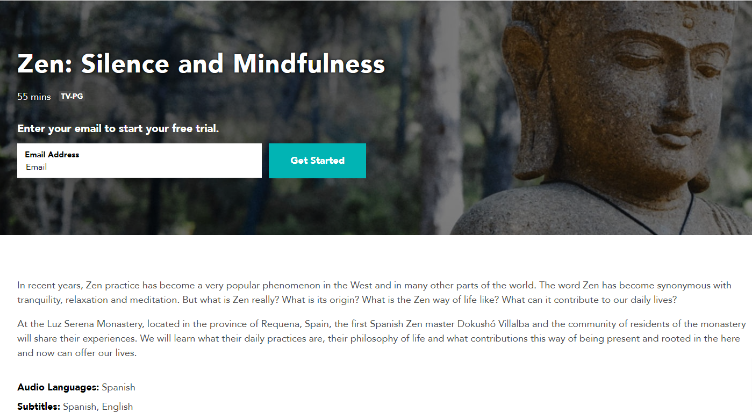
This program provides training in meditation and relaxation. Although it is a Spanish course, you can still access it with English subtitles.
With this course, you’ll learn to incorporate a rooted life philosophy into your fast-paced life. It will help you incorporate tranquility into daily practices.
3. Mindfulness for Anxiety and Sleep
The Radical Compassion Institute provides the Mindfulness for Anxiety and Sleep: Learning Practices that Help Reduce Stress and Calm Fears course.
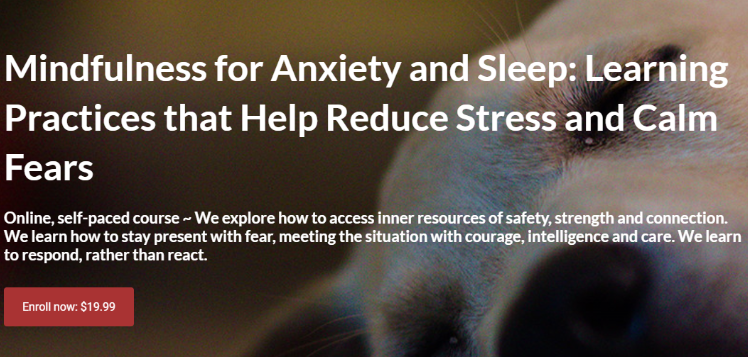
The course name says it all: It will help you reduce your stress and calm your fears. This course will also guide you in managing your thoughts and emotions.
In the chaotic world, you’ll face fear and find self-compassion and Mindfulness. These help you be reliable by utilizing your inner resources of safety, strength, and connection.
4. ‘Search Inside Yourself’ Program Intro
The ‘Search Inside Yourself’ Program Intro is introduced on the Mindfulness Exercises platform, where you will learn to stay resilient and embark on a growth journey.
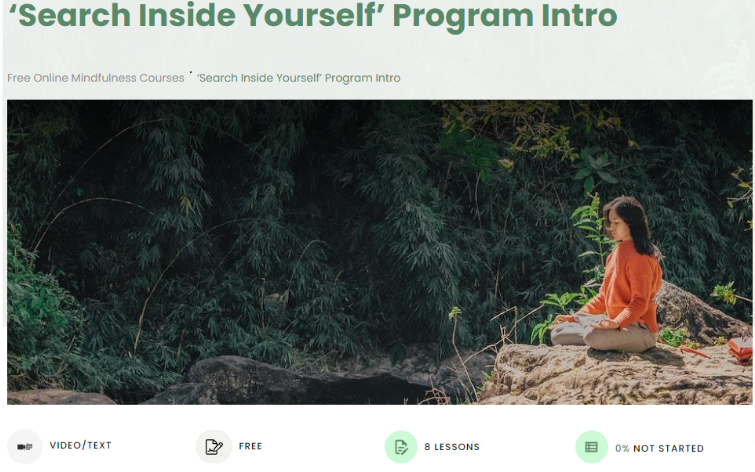
The ‘Search Inside Yourself’ program teaches you to be a practical, mindful leader and to balance emotional intelligence. It will help you improve intra-personal and inter-personal skills.
5. Mindfulness for Busy People
Udemy learning platform provides the Mindfulness for Busy People course for everyone stuck in their hectic schedule.
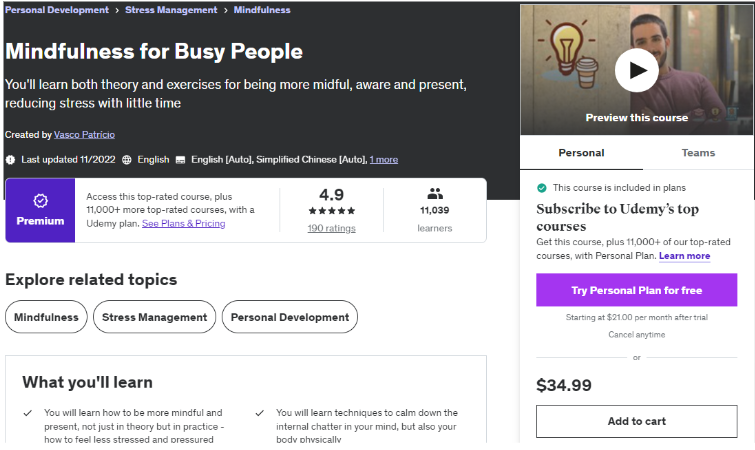
This course helps you to manage your stress by balancing work and home life with peace. It is best for employees, businessmen, entrepreneurs, and even students who are busy in their schedules.
The Mindfulness for Busy People course will explain techniques and practices for relieving stress and balancing home and work life.
Top 5 Meditation Courses:
Meditation brings peace to your life. It is a daily practice to concentrate. This helps to stay focused and relaxed in personal and professional life. Here are the top 5 meditation courses to guide you;
1. The Art of Meditation: A Beginners Guide
Learn The Art of Meditation: A Beginners Guide on Udemy, the online learning platform. This course is best for beginners who want to meditate in a simple and fun way at their own pace, anytime, anywhere.
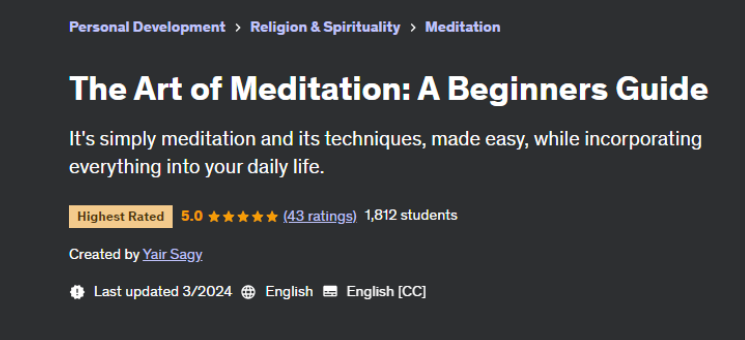
If you ever felt stressed, anxious, or overwhelmed by life challenges, learn the techniques with ‘The Art of Meditation.’ This course will help you find peace, joy, and balance in your daily routine.
You can enroll in the course through Udemy and connect with self and spirituality with meditation.
2. Transcendental Meditation
Discover the personalized journey with inner peace, clarity, and wellness provided on the Official TM Website. Various Certified TM Teachers instruct Transcendental Meditation.
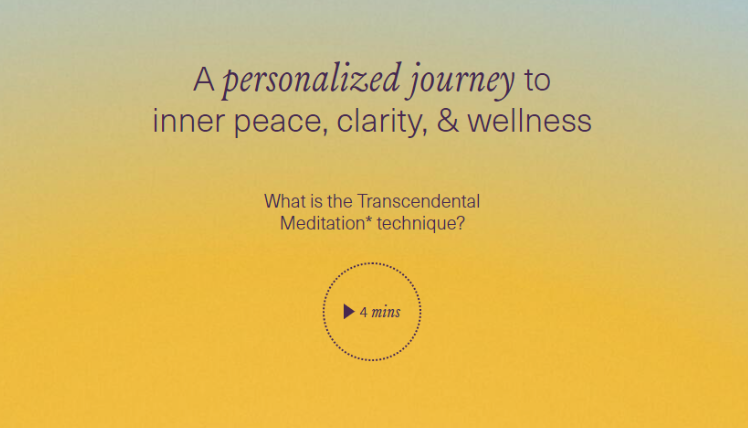
This program provides a specific form of meditation using a mantra. Moreover, it involves one-on-one instruction and follow-up sessions to guide you.
You can learn the meditation practices without any effort with the proper techniques taught by instructors in the ‘Transcendental Meditation’ course.
3. Ziva Meditation
Ziva Meditation is a platform that offers meditation training focusing on stress reduction, increased productivity, and overall well-being.
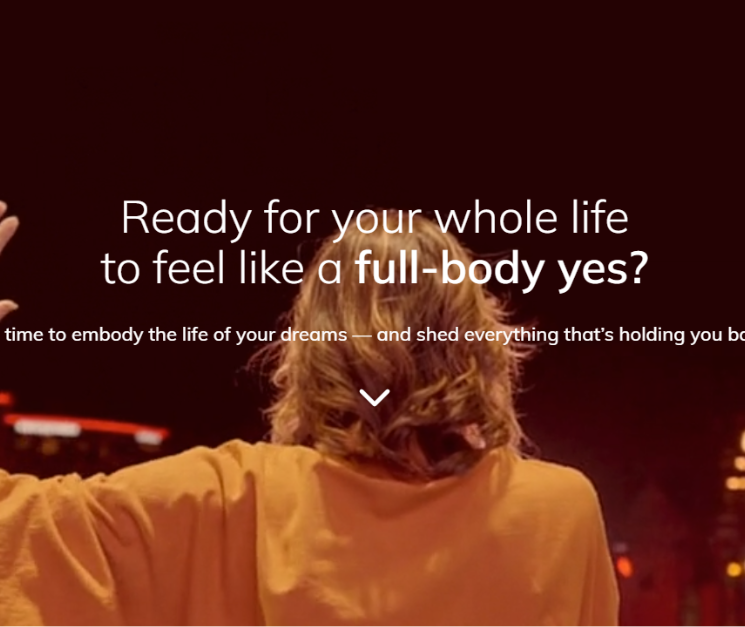
Ziva Meditation combines mindfulness, meditation, and manifesting techniques to improve mental clarity, emotional resilience, and physical health.
These meditation courses are mantra-based practices aimed at deep relaxation and stress release.
You can even enroll in free masterclasses to understand the course practices, training, and techniques.
4. Meditation: A Way to achieve your goals in Life
Coursera, the tech learning platform, provides meditation courses. Among all the ‘Meditation: A Way to achieve your goals in Life’ is best for beginners.
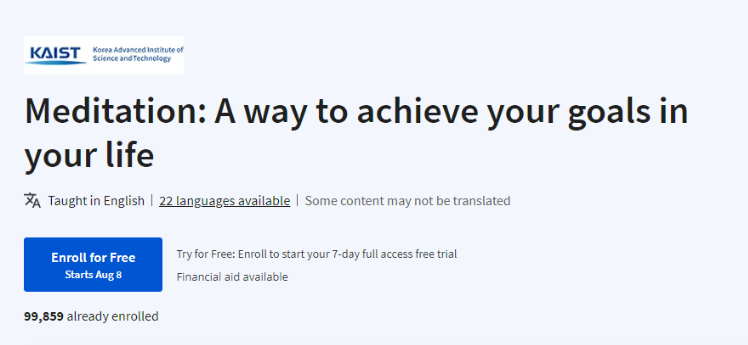
Coursera’s ‘Meditation: A Way to Achieve Your Goals in Life’ course teaches you the necessity of self-reflection to draw your life graph with happiness and mental fulfillment.
This course, which focuses on human nature and possessions, and available in 22 languages with English audio. In it, you will learn that ‘Self-reflection is the first step to meditation.’
5. Mindfulness and Meditation
Masterclass provides a Mindfulness and Meditation course taught by Mindfulness expert Kabat-Zinn.
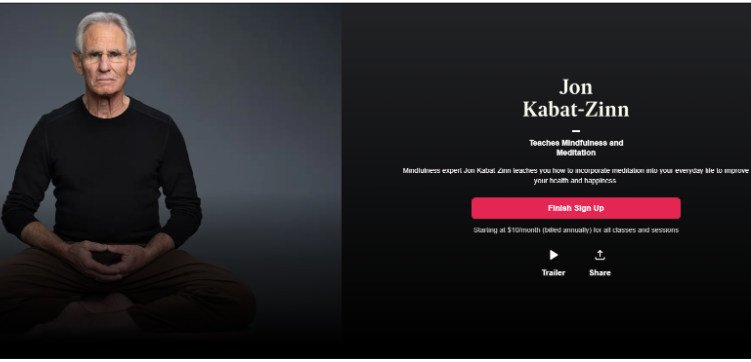
This course helps you cultivate mindfulness and teaches you to reduce stress and soothe your thoughts with meditation and movement.
With the live examples and best tips, you’ll learn to build a meditation routine for your well-being.
Mindfulness Vs. Meditation: Which Is Better?
Both Mindfulness and Meditation are interchangeable practices, yet they have distinct application techniques.
- Mindfulness practice involves being fully present in the current moment, being self-aware of thoughts, feelings, body sensations, and the surrounding environment, and being confident in one’s ability to do so.
- Meditation is helpful for Mindfulness. It is a formal practice that involves setting aside time to focus on a specific object, thought, or activity. This practice aims to quiet the mind and promote relaxation and mental clarity.
Mindfulness and Meditation are both the best practices for being present in every moment of your life. Learning the techniques and practices for better clarity depends on your purpose and situation.
What is Mindfulness Meditation?
Mindfulness Meditation practice combines the principles of ‘Mindfulness’ and ‘Meditation.’ It helps cultivate a state of focused attention and awareness.
These practices involve paying attention to the present moment without judgment, typically focusing on the breath, bodily sensations, or other objects of focus. You can do it by gently acknowledging and letting go of distractions as they arise.
‘Mindfulness Meditation’ is a powerful tool for cultivating a calm, focused, and aware mind. By following this practice, you can simply reduce stress, improve focus, and find peace in your day-to-day routine. It is a way to connect with yourself and the present moment.
Related Reads:
Conclusion: Enrichment Of Mindfulness vs Meditation!
Mindfulness and Meditation are valuable practices that offer unique benefits. Moreover, one is not necessarily better than the other. Both practices complement each other, focusing on mental well-being.
Integrating Mindfulness and Meditation techniques into daily life can help reduce anxiety, stress, and improper sleep habits. This enables you to manage stress, calm your mind, and cultivate deep relaxation.
Choosing between Mindfulness and Meditation depends on your personal goals and lifestyle. Ultimately, incorporating both practices can lead to a balanced life with greater ease and satisfaction.
